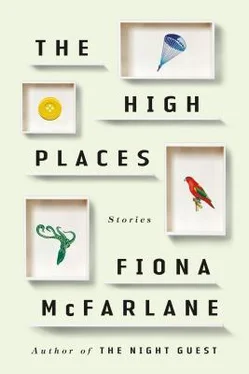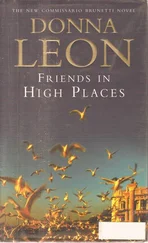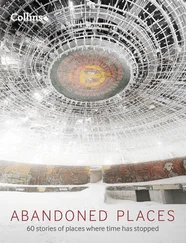When I heard they were engaged, Alice and Mr Smith-Jones, I retired my scooter. I took a job at a printer’s, and the finicky hours of setting type gave me time to think things over. On the day of their wedding I dressed in costume. In the movie I play the role of a man about town; you can see me in the lower right at 20:16, loafing with friends on a street corner while gauzy women flutter behind us, in and out of seedy cottages. Yes, right there — I’m the one watching the dog. I walked to the church among applecarts and small sooty boys, and there was a yellow quality to the air, a residual loveliness, as if the sun had gone down hours before but stayed just below the horizon. The church doors swung open before me, revealing soft pale heads among bridal flowers. The parson — my father-in-law — trembled in the moment when I should speak or forever hold my peace. I spoke. Eddie and I met in the aisle; he swung and I dodged and I swung. Alice shook in her slim white dress, and roses fell from her hands. I floored Eddie; he pulled me down. We rolled on that ecclesiastical carpet, up and over and around and down, while flustered ushers danced at the edges of our combat. Ed would be on the verge of springing up, a lawyerly Lazarus, but I clawed him back down; I, on my knees, would be making my way altar-ward, only to find him wedded to my foot. The organ began to play. The congregation piped in alarm. An elderly woman keened among her millinery. Finally we exhausted ourselves, and it was me — me! — Alice came to comfort. Edward loped away into the high noon of heartbreak. Her counterfeit father had been ready to join them in mock matrimony, but with a merry shake of his worldly head he rejoined us instead. The sun set, and the moon rose. We ate ices at the reception, and great silver fish surrounded by lemons, and that night my wife gave a virginal shudder as she withdrew her slender foot from her slender slipper.
There followed a happy time of croquet and boating expeditions; then Alice went through her suffragette period, of which I pretended to disapprove. Things are more settled now. We read Darwin together, without telling her parents, and she’s discovered Marx. We take walks in the country, where my naturalist wife sends me scrambling into trees for birds’ nests. Things aren’t what they used to be, but there are consolations: a certain elegance to the way she stands at open windows, and longer, darker nights now that the town has switched from electricity to gas. But I’ve noticed in her lately a strange inability to see the resemblances between things: a tennis ball (she plays modestly, in white dresses) is nothing like the sun; a glass of water, she says, has no relation to the ocean; she scowls if I comment on the similarity between her neck and a swan’s. In fact she dislikes the similarity of things even without recognising their likeness, and can’t bear, for example, to see a brown short-haired dog on brown short-haired grass. The rest of the town is like this too. They have a horror of seeing photographs of themselves, even the hoary daguerreotypes they love so much. They’ve removed all the mirrors from their houses, and the paintings of jaded horses on hillsides, and the china that depicts, in blue and white, the far-flung tale of luckless lovers. It’s as if they’re allergic to the very idea of reproduction; or, at the very least, don’t wish to be reminded of it. What a singular world they live in, in which no thing has any relation to another! They no longer mention the movie. They no longer watch movies. They’ve taken up laudanum. They expect to live forever. They seem happy, however — timeless and happy. I watch them all, a little wistfully, in my fraudulent frockcoat. Meanwhile, the trees shake out their leaves in the wind, and in the evenings my wife walks through the spent garden. Her face is like a flag that says Surrender .
Cara’s mother was at her best on Saturday nights. On Saturday nights she lit long white strings of Christmas lights and little candles in tins. She took the rubber bands off the wind chimes, which otherwise kept her awake at night, and hung paper lanterns from the clothesline. The back screen door opened and shut as the children ran in and out of the garden, to see the lanterns and bat at the wind chimes; the door snapped and thundered and let in gusts of mosquitoes until Cara told them to stop it, and Cara was the eldest, so they did. But their mother, Rachel, didn’t care how much noise they made, because it was Saturday night. She was black-haired and red-mouthed, she wore a sharp scent and a floating white dress, and now she produced her purse from somewhere (she always hid her purse, with so many children and so many boyfriends, though for the moment there was only one boyfriend, only Adam). She sent Adam out for fish and chips. Now that he lived with them, he could be sent on errands. Cassidy went with him, because Cass was the oldest boy.
Cara set the long dining table while they were gone. First she bundled away last week’s dirty tablecloth. The younger children bumped and ran and offered their help, and Cara had to calm them — she let them straighten the new tablecloth, carry knives and forks, salt and pepper, and, in a confident mood, the cool pink bottles of sweet chilli sauce. But only Cara was allowed to open the cabinet in the corner and choose the platters for the middle of the table, the special glasses in blue and green and purple, and the vases in milky silver. The children trailed Cara into the garden and watched as she cut flowers (she had little shining scissors expressly for this task, they used to be her grandmother’s, and they hung in the kitchen from a piece of velvet ribbon); depending on the season, she cut freesias or ferns or squat yellow daisies, swags of Christmas bush or oleander, and whatever she chose Rachel accepted and turned into bouquets, perfect, without even trying.
The guests began to arrive: friends of Adam’s, friends of Rachel’s, people Rachel worked with and people Cara had never heard of before, not always young and pretty but always with some distinguishing feature — an electric-blue hat, a foreign accent, a vast cosy beard — and they brought bottles of wine or beer and sometimes sweet-smelling dishes covered with tea towels, and baskets of bread. The children were introduced: Cara, Wallis, Marcus, Elsa; Cassidy is out with Adam getting dinner, said Rachel, don’t worry about remembering their names, nobody does. The younger children looked at their mother, anxious. They were shy for a minute and wanted jobs to do.
Cara turned ice cubes out into glasses. She found bags of nuts in the cupboards and poured them into smooth wooden bowls; the kids could pass them around. Elsa was naked and it didn’t matter. Marcus had unearthed two old Christmas crackers; they snapped, people shouted and laughed, Marcus and Wally wore tissue-paper crowns for the rest of the night. Cass and Adam returned, laughing in the steam of their hot parcels, Cass self-important because he had been allowed to burrow into his for salty chips on the way home. Into the dishes on the table: piles of battered fish, potato scallops, chips, and lemons cut in wedges. Coleslaw out of a plastic container. Then the long meal, the arms crowded onto the table, everybody swinging plates and lifting drinks, using their fingers, kicking each other without meaning to. Apologies, jokes, music to which no one listened. Elsa spilled her drink; Cara mopped it. Cara found more lemons. Stains bloomed on the white tablecloth, the ice all melted. Send Adam for more! Adam went for more ice; Cara offered to go with him. Out into the dark streets, the running traffic, people walking to the pubs or walking their dogs or walking arm in arm and who knows where. The service station was only two streets away, and Adam smoked as he walked; he said very little, sang one time, turned his head from Cara to blow smoke. Cara hung back as he bought the ice. She watched as girls came into the service station swinging the keys to their little cars; she watched as they spotted Adam, looked again — some of them knew him and approached with cries and squeezes. Sometimes he would introduce her as ‘my Cara mia’, and these girls would smile and squeeze her too. Once, some girls from Cara’s school were there; they asked who he was and Cara said, ‘He’s Mum’s boyfriend,’ but she would have preferred to say ‘I’m his Cara mia.’ And the girls from school gaped and said, ‘I thought he might be your brother,’ which was a compliment, because he was so good-looking, but it also meant he was too young to be any mother’s boyfriend. The best part was coming home: the house lit up behind the trees, all the windows wide, and everyone inside quiet for a moment as the man with the beard told a story or the woman with the accent sang a song; then, just as Cara and Adam passed through the front gate, all the voices started up, sometimes applause or laughter, and the people walking on the street would see and hear and wish they could go into the house and be welcomed there; and Cara could.
Читать дальше












